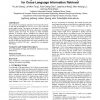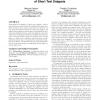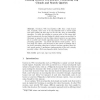504 search results - page 45 / 101 » Determining the user intent of web search engine queries |
WEBI
2005
Springer
14 years 1 months ago
2005
Springer
Search engines are powerful tools to find information on the Web. However, they commonly return a lot of irrelevant documents when the users’ queries are not specific enough. To...
SIGIR
2004
ACM
14 years 1 months ago
2004
ACM
It is crucial for cross-language information retrieval (CLIR) systems to deal with the translation of unknown queries1 due to that real queries might be short. The purpose of this...
CIKM
2007
Springer
14 years 1 months ago
2007
Springer
Web search engines consistently collect information about users interaction with the system: they record the query they issued, the URL of presented and selected documents along w...
WWW
2006
ACM
14 years 8 months ago
2006
ACM
Determining the similarity of short text snippets, such as search queries, works poorly with traditional document similarity measures (e.g., cosine), since there are often few, if...
ICWE
2010
Springer
13 years 5 months ago
2010
Springer
Nowadays, Web encyclopedias suffer from a high bounce rate. Typically, users come to an encyclopaedia from a search engine and upon reading the first page on the site they leave it...



